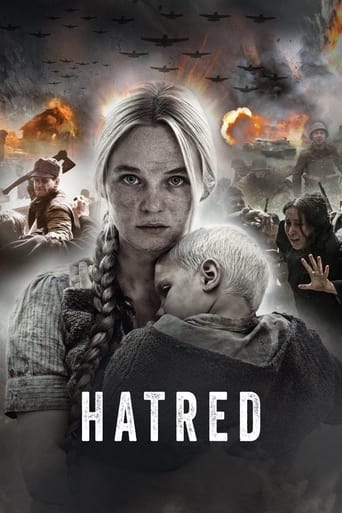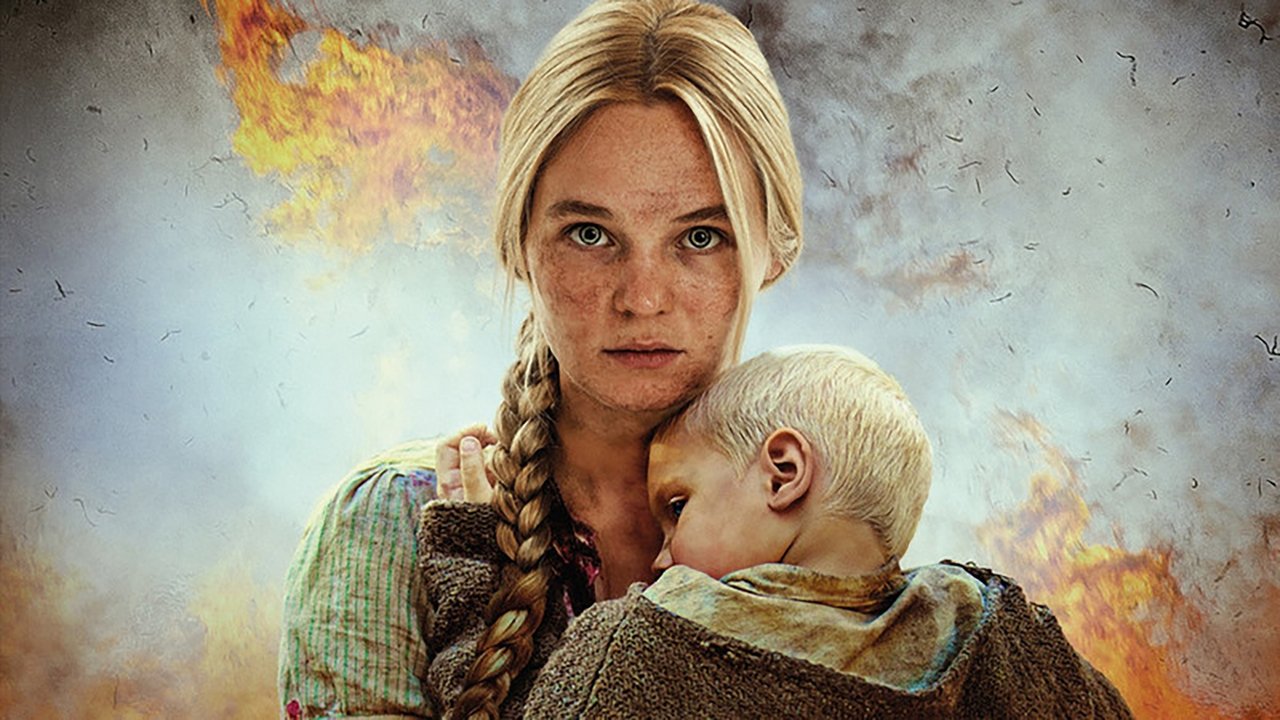euroGary
The 2017 Edinburgh International Film Festival showed 'Wołyń' under the title 'Volhynia'. The film's official English title, however, is 'Hatred'.While Europe was tearing itself apart during the Second World War, another conflict, between Poles and Ukrainians, was going on in eastern Europe as militant Ukrainian organisations sought to expel all non-Ukrainians (chiefly Poles, but Jews as well) from the territory of a future Ukrainian state. This film centres on the impact of the violence on an ethnically-mixed village of Poles, Ukrainians and Jews, with the central character being Zosia, the prettiest (and blondest) girl in the village, who is in love with Petro, the prettiest (and blondest) *boy* in the village. But her father marries her off instead to Maciej, the village's much-older alderman. As awful as this is for Zosia, these domestic concerns pale into insignificance as the inter-ethnic violence is unleashed...... and unleashed it certainly is. When the film's interminable opening wedding scene ended I was glad because it meant the women finally stopped singing; but then I got bored with the violence - there are only so many times you can see someone having their spine pulled out before you stop paying attention. And that is a shame, because this is, after all, based on real events and real suffering. Director/writer Wojciech Smarzowski (adapting short stories by Stanisław Srokowski) would have done better to produce a shorter film (2½ hours is too long), keeping the character development and focussing on just one or two violent incidents - that, I feel, would have had more impact (and not resulted in this particular viewer, on seeing someone pulled in half between two horses in yet another gory scenario, dispassionately thinking "surely his arms would pop out first?")I found it difficult to keep up with who was Polish and who was Ukrainian - although the sub-titles are helpfully laballed 'Pol' and 'Ukr' - as so many of the characters speak in both languages anyway. I did appreciate that the film made the point that Poles were not only victims: they committed acts of violence also. And I liked the character bits. So I would recommend watching it once, but I doubt that I will watch it again.
pada
Wow , I don't think I've felt as sad after a film . Immediately it made me want to learn more about the history surrounding this period of the war . First of all i'd warn you this film is graphic if you think about Rwanda you'll be prepared . Poland in the 20th century stood on the political and aspirational fault line between Germany and Russia and became the battlefield of those two opposing forces . It's history is intertwined with the rise and fall of the central and Eastern European empires namely Poland-Lithuania, Russia , Ukraine , Habsberg , Austria-Hungary , Nazi Germany , Naploeonic French Republic just to name a few and as a result the ethnic mix within its borders contains a volatile religious fault line between Catholicism and Orthodox Christianity . It's this fault line that provides the plot of the film . The script , costume , acting and cinematography all deserve praise . We start with the happiness of inter marriage weddings and the national songs that go along with that and end with destruction hatred and death , it's not a happy film but it's not a triumphant slice of history , it's a period of time that man should be ashamed of how sick he can become when encouraged to by those who wear the cloth of god and should know better .But it is an important film and I'm glad I've seen it but it really made me sad . It's definitely worth seeing but be prepared to lose your smile .
Witold Pluta
Motion pictures set within time and place of a great historical value seems to be the current trend for Polish film makers. Every "patriotic" movie receives a tremendous promotion before it even hits the box office. It was pretty much the same case with "Wołyń". The director seems to be working with the same choice of actors which is a good thing as they can definitely deliver. The performance of the cast makes this sad historical drama gripping. The story which was based on the real (extremely controversial) events is also the key factor of a very positive reception among the viewers. Being aware of the fact that the subject of the story requires careful handling, Smarzowski included several scenes which absolutely don't fit the whole movie causing a bit of a confusion. However, the scenes save the movie from potential political accusations.
Tomasz
Dire, thick atmosphere of waiting for massacre you knew that will happen. Pure terror unleashed at night, when neighbors come to kill you in one hundred different ways preceded by showing how this community was like at time of peace. You would not think that it is really possible. Marriages, working together, social space and to some degree language is common. But there are some differences on both sides...Dmytro Klyachkivsky citation: "We should make a large action of the liquidation of the Polish element." To understand this film properly you need some historic and psychological (Lucifer effect) background. I am certain that when reversed things would have gone south anyway.Wolyn (Volhynia) is historic region where poles and Ruthenians lived peacefully for centuries (by that I mean peasants). Around XVII century Poland gained more territory in what today is called Ukraine. Polish noble class assimilated Ruthenian (today Ukrainian) noble class. One of Ruthenians even become elected king of the Commonwealth of Polish and Lithuania. Wolyn alone was in polish rule from XIV century.This whole territory east of Wolyn and including Wolyn was a place where polish peasant run away from polish noble class (szlachta) rule and mixed with local Ruthenian population.Commonwealth wanted to suppress those people. Thousands of them remained on king payroll as soldiers - so they knew how to fight. Those people responded accordingly with Chmielnicki uprisings, killing Poles and assimilated Ruthenian nobles. Century of bloodshed ended by Russian subjugating most of these lands. This is why eastern Ukraine (Russian rule) is different from western Ukraine (Polish rule).Era of nationalism resulted in Ukrainian National Revival when Ukrainian people gained new identity and were distancing from Polish and Russian cultures.In interbellum period in Poland unfortunately won the idea of unity - Ukrainians and Belorussians was to be assimilated into Polish culture (there was project of creating Polish, Belorussian and Ukrainian separated states in confederation) Ukrainians responded with violence. And film starts when this period is about to end. Firstly Russians witch to this date see Ukraine as "little Russia" in a derogatory way) and next Germans which promised own state to Ukrainians.Ukraine had seen Hitler as they savior in a way. Organisation born from this feelings decided that Wolyn must be ethnically cleansed to ensure Ukrainian nature of this region in future. That's when Lucifer Effect starts to sink in. Same was in Tutsi - Hutu case.



 AD
AD

